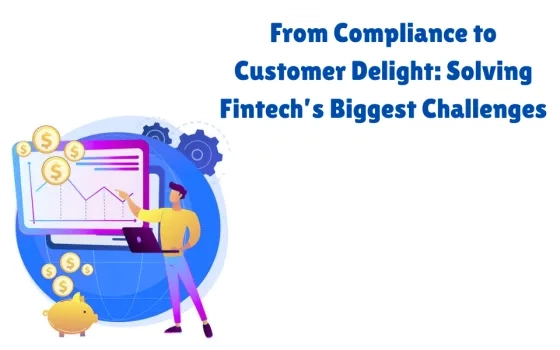Picture a financial platform that’s lightning-fast, frictionless, and loved by users, while staying bulletproof in the face of audits and regulations. Sounds like a fantasy? For many fintech businesses, striking this balance between innovation and compliance often feels like walking a tightrope.
The stakes are higher than ever. As digital finance reshapes everything from payments and lending to wealth management and insurance, customers expect instant gratification, seamless experiences, and absolute trust. Meanwhile, regulators are tightening their grip to ensure transparency, fairness, and security. And let’s not forget about the competition—startups and legacy players alike are racing to out-innovate one another.
But here’s the truth: every fintech challenge—whether it’s navigating ever-changing regulations or meeting rising customer expectations—is a disguised opportunity. And the key to unlocking that opportunity lies in smart, strategic Fintech Software Development.
In this article, we break down the biggest hurdles facing the fintech industry today and explore how modern software development practices are solving them. Whether you’re a founder building the next big thing or a financial institution looking to digitize, this guide offers real-world insights to help you move fast without breaking things—or rules.
The Compliance Conundrum: Navigating a Regulatory Maze
Compliance isn’t optional in fintech—it’s foundational. But the challenge is that regulations shift across regions and evolve. From KYC and AML to GDPR and PCI-DSS, staying ahead of legal frameworks while scaling your app is no easy feat.
The Problem
- Constantly evolving legal landscapes
- Region-specific compliance needs
- Heavy fines for non-compliance
- Complex documentation and audit trails
The Solution
Modern Fintech Software Development integrates regulatory compliance directly into the software architecture. That means:
- Automated KYC/AML verification through third-party API integrations
- Role-based access control and data encryption to meet security requirements
- Audit-ready dashboards for real-time reporting and monitoring
Compliance becomes a feature—not a bottleneck—when it's baked into your tech stack from day one.
Security: The Front Line of Trust
In the world of digital finance, security isn’t just about protecting data—it’s about protecting your reputation. A single breach can undo years of customer trust and growth.
The Problem
- Rising incidents of data breaches and fraud
- Sophisticated cyberattacks targeting financial systems
- Difficulty in maintaining multi-layered protection while scaling
The Solution
Advanced fintech software incorporates security at every level:
- End-to-end encryption for sensitive financial transactions
- Biometric authentication and multi-factor authentication (MFA)
- Real-time fraud detection powered by machine learning
- Regular penetration testing and security audits
Software developers now approach security using “zero-trust” architecture—treating every access request as a potential threat until verified.
Customer Experience: The New Competitive Advantage
Today’s users don’t just compare your platform to other banks or fintech apps—they compare you to their last great digital experience, whether that was on Netflix, Uber, or Amazon.
The Problem
- Users expect instant transactions and intuitive interfaces
- Clunky onboarding leads to high drop-off rates
- Generic user experiences feel outdated in an era of personalization
The Solution
Fintech Software Development focuses on delivering delightful, frictionless experiences through:
- Personalized dashboards using AI-driven user behavior tracking
- Instant digital onboarding with eKYC and document scanning
- Real-time transaction alerts and interactive push notifications
- Responsive, mobile-first UI design tailored to diverse user needs
Building customer-centric apps is no longer optional—it’s the only way to stay relevant.
Scaling Pains: From MVP to Millions
You’ve validated your fintech product, traction is picking up, and suddenly you’re dealing with more users, more transactions, and more complexity. Without scalable infrastructure, this growth can quickly lead to breakdowns.
The Problem
- Performance issues during traffic spikes
- Long deployment cycles slow down innovation
- Monolithic architecture creates bottlenecks
The Solution
The answer lies in scalable fintech software design:
- Use of cloud-native platforms like AWS or Azure for real-time scaling
- Microservices architecture for independent feature deployments
- CI/CD pipelines to ensure faster, safer releases
- Load balancing and caching to ensure smooth user experience at scale
With the right software backbone, scaling up becomes a matter of turning up resources—not rewriting code.
Integration Headaches: A Fragmented Financial Ecosystem
Fintech applications rarely work in isolation. Whether it's connecting with banks, payment gateways, CRMs, or accounting software—seamless integration is critical.
The Problem
- Legacy banking systems with outdated APIs
- Inconsistent data formats and latency issues
- Risk of downtime during integration or updates
The Solution
Fintech developers overcome this with:
- API-first design—ensuring the software can easily “talk” to any platform
- Use of middleware to standardize communication between old and new systems
- Webhooks and event-driven architecture for real-time updates
- Building custom connectors to legacy platforms when necessary
This means smoother partnerships, quicker feature rollouts, and better ecosystem interoperability.
Data Intelligence: The Untapped Goldmine
Data isn’t just a byproduct of financial activity—it’s the most valuable asset in a fintech company’s arsenal. But collecting data is one thing. Using it effectively is another.
The Problem
- Massive volumes of unstructured data
- Lack of real-time insights
- Limited ability to personalize experiences or prevent churn
The Solution
Modern Fintech Software Development enables:
- Advanced analytics dashboards for both users and admins
- AI-driven financial insights like savings suggestions, budget alerts, etc.
- Predictive analytics for detecting risky transactions or upselling new products
- Integration with big data tools like Hadoop, Spark, and Snowflake
Smart data handling not only drives better decisions—it creates new revenue opportunities.
Globalization: One Market at a Time
Fintech is increasingly borderless, but expanding into new geographies isn’t as simple as translating your app.
The Problem
- Diverse regulations and banking standards
- Currency and tax differences
- Language, UX, and cultural nuances
The Solution
Custom fintech solutions are built to be globally adaptable:
- Modular codebase that supports region-specific features
- Multi-currency and multi-lingual support
- Localized compliance modules
- Geo-fencing features for region-specific promotions or features
This enables fintech businesses to scale internationally without a total platform overhaul.
Choosing the Right Development Partner
Many of these challenges can’t be solved with off-the-shelf software. That’s why working with a custom fintech software development company makes a strategic difference.
What to look for:
- Proven experience in fintech domains like lending, payments, insurance, etc.
- Deep understanding of regulatory and security landscapes
- Agile development practices for rapid iteration
- A collaborative approach that includes business strategy, not just code
By aligning development efforts with your long-term vision, the right partner helps future-proof your product from both a compliance and innovation perspective.
Final Thoughts: Turning Obstacles into Opportunities
Fintech is no longer a niche—it’s the new normal. And in this rapidly shifting landscape, success isn't just about having the flashiest features or the slickest UI. It's about solving meaningful problems for users while staying aligned with the rules that govern financial ecosystems.
By investing in thoughtful, scalable Fintech Software Development, businesses can turn compliance from a burden into a competitive advantage and elevate customer experience from functional to delightful. The best solutions don't just keep you out of trouble—they set you apart.
From automating KYC to building intelligent payment platforms and intuitive financial dashboards, today’s technology enables fintech companies to meet complex demands with agility, transparency, and trust.
The path forward lies in building systems that are not only resilient and secure, but also human-centric and future-ready. Partnering with a fintech-focused custom development team ensures that your product evolves with regulations, scales with your business, and grows with your users















Comment
The piece delves into the fintech sector's evolution from mere compliance to prioritizing customer experience. It emphasizes the importance of integrating regulatory tech to streamline operations and build trust. Given the rapid digital transformation, how can fintechs ensure that their compliance strategies also enhance user engagement and satisfaction.